Posted July 8, 2016 by Nicky in Reviews / 5 Comments
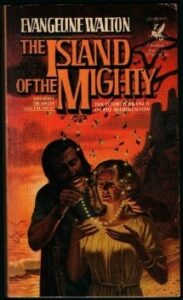 The Island of the Mighty, Evangeline Walton
The Island of the Mighty, Evangeline Walton
Originally reviewed 17th June, 2011
Island of the Mighty retells the last branch of the Mabinogion, the story of Gwydion, Arianrhod, Llew Llaw Gyffes, Blodeuwedd and Goronwy. It begins with a retelling of stealing the pigs belonging to Lord Pryderi. Gwydion uses this to provoke war, allowing his younger brother to rape the king’s footholder. This also leads to the death of Pryderi, which doesn’t endear Gwydion to the reader who has also read the retellings of the other three branches — and also to the disgracing of Arianrhod and the birth of Llew Llaw Gyffes.
The themes Evangeline Walton explored in the other books come to fruition here, as power passes more and more from women to men, even power over birth and the rearing of children. Arianrhod is not very sympathetically dealt with, I have to say: often Walton’s work suggests that the passing of women’s power is a bad thing, but Arianrhod is capricious and unkind, considered by characters and text unnatural — for the crime of not having wanted to bear a child! Blodeuwedd isn’t treated with much sympathy here, and the other women are barely characters.
It’s hard to sympathise with most of the characters here, particularly as they stir up war, steal, lie and trick each other. I still enjoyed it as a retelling and think Walton dealt well with the material, but I wish she’d been kinder to Arianrhod and Blodeuwedd, who were both unable to fit in the patriarchal society that wanted power over women’s bodies, and expected them to abide by two conflicting sets of rules.
Rating: 3/5
Tags: book reviews, books, Evangeline Walton, Flashback Friday, SF/F, Wales
Posted July 6, 2016 by Nicky in Reviews / 0 Comments
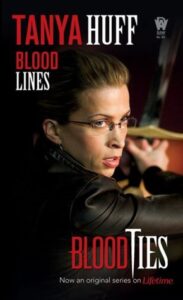 Blood Lines, Tanya Huff
Blood Lines, Tanya Huff
If you enjoyed the first two books, this is more of the same, and that’s not a bad thing at all. I find them fairly comfortable reads, though some of the themes may be fairly harrowing — the effects of the curse on Henry, Tony’s fear, the attempt to torture Vicky… But it’s also classic: it’s basically a mummy with a curse, and it’s fun to watch the characters running around trying to cope with that.
Of course, in terms of character development, the book also throws Vicky, Mike and Henry together to work with one another again. And naturally, that doesn’t go one hundred percent as any of them would hope. Mike and Henry still have to learn to work together, because Vicky won’t put up with their pissing contests. (And Henry’s relatively civilised in general, but I still feel like if Mike Celluci wanted to have a dick measuring contest, Henry could be provoked. And don’t get me wrong, I like that byplay between them.)
I like the ending a lot — not just Vicky firmly telling Mike and Henry not to baby her, but also the larger plot (though I don’t know if it gets used later) about the three of them knowing of the existence of a god who thrives on pain, who could worm his way into their minds and use them, someday. Vicky’s way of dealing with that fact is great.
Rating: 3/5
Tags: book reviews, books, SF/F, Tanya Huff
Posted July 5, 2016 by Nicky in Reviews / 4 Comments
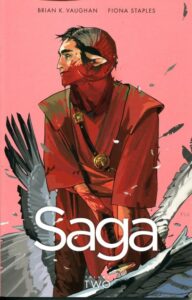 Saga Volume Two, Brian K. Vaughan, Fiona Staples
Saga Volume Two, Brian K. Vaughan, Fiona Staples
In volume two of Saga, Fiona Staples’ art continues to really shine. She manages to make the characters come alive, conveying movement and expression, mood and attitude and even a little of their voice. It helps that the characters are pretty awesome: the Lying Cat is a pretty amazing creation, Alana, Gwendolyn and Marko’s mother are straight-up badass, the interlude with Barr manages to inject just enough emotional attachment…
Oh, and in case you were wondering if Marko’s ex-fiancé was a fridged love interest who wouldn’t turn up again because his love for Alana is all the matters, nope. Gwendolyn shows up, kicks ass, and has very decided opinions about Marko and what he’s up to.
And I do love the device of the narrator being Alana and Marko’s child; it sets the tone, and makes some scenes less harrowing, while also bringing in hindsight.
And don’t forget the humour. Normally, I’m quite difficult to please when it comes to Saga, and it’s possible I wouldn’t laugh at the visual and verbal jokes if someone made them IRL. However, when it’s me and a book…
Rating: 4/5
Tags: book reviews, books, comics, SF/F
Posted July 5, 2016 by Nicky in General / 6 Comments
This week’s theme is ‘Top Ten Underrated Books’ — books with less than 2,000 ratings on Goodreads. Some of these only have a handful of ratings, though some are more popular; I tried to pick a range, because if I just picked the most underrated books it’d all be Welsh fiction, and y’all probably wouldn’t be that interested. (But if you are, go forth and read Kate Roberts, Rhys Davies, Menna Gallie, Margiad Evans…)
- The Man Who Went into the West, Byron Rogers. A biography of R.S. Thomas, this was a lovely mix of fact and rather chatty character portrait: it makes R.S. Thomas come alive, as a man of contradictions and contrasts.
- The Hidden Landscape, Richard Fortey. Or any of Fortey’s books, really; something about his style made even geology fascinating to me, and I’m not actually that interested in geology. There’s a poetry to the landscape and the long shaping of it which Fortey sees and communicates very clearly.
- Cold Night Lullaby, Colin Mackay. Only read this collection of poetry if you want your heart to be ripped from your chest. It covers the poet’s experiences in Sarajevo as an aid worker, and inspired Karine Polwart’s song ‘Waterlily’. The video here includes Polwart’s introduction to Mackay’s life and work.
- Dead Man’s Embers, Mari Strachan. Painful in a different way, this book follows the recovery of a man returned to his Welsh village after the Great War. There’s a touch of magic realism, but the emotional heart of the story is very real.
- A Sorcerer’s Treason, Sarah Zettel. I haven’t read this in ages, and in fact need to reread it, but I remember it very fondly — and remember passing it round to various friends and relations, hence why my partner has a stack of this series tempting me to reread now…
- A Taste of Blood Wine, Freda Warrington. I really didn’t expect to fall so in love with a gothic vampire romance, but it’s so unapologetic about examining the effects of the vampires and the way they choose to live on the people around them that I fell for it all the same. I think fans of Jacqueline Carey’s Kushiel books would probably be a good fit.
- Iron and Gold, Hilda Vaughan. A classic fairytale situation, in a Welsh setting; it humanises the fairytale, making the pain of it really hit you, while also examining human relationships and how they work.
- The Complete Brandstetter, Joseph Hansen. I’ve been amazed at how little I’ve ever heard about these books since my housemate wrote a dissertation on gay detectives in crime fiction. It deals with so many issues — AIDs, racial issues, homophobia, and beyond that into aging, relationships in general… and also delivers solid story after solid story.
- Exiled From Camelot, Cherith Baldry. I read this for my own dissertation, which probably accounts for how fond I am of it. It’s not perfect, but the bond between Arthur and Kay is painfully real (and something often neglected in other modern fiction). It’s also an interesting mixture of materials, with stuff straight from both the Welsh sources and the much later Continental tradition.
- The Fox’s Tower, and Other Tales, Yoon Ha Lee. I love microfiction, and this is one of the few collections I can think of which I would fairly whole-heartedly recommend. Yoon Ha Lee gets the art of the really short story.
I’ll be interested to see what other people have picked out this week — especially if you talk a bit about why. Link me!
Tags: Arthurian, books, poetry, SF/F, Top Ten Tuesday, Wales
Posted July 2, 2016 by Nicky in Reviews / 0 Comments
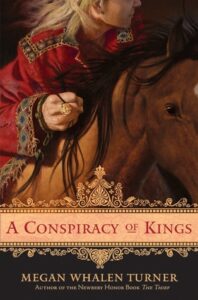 A Conspiracy of Kings, Megan Whalen Turner
A Conspiracy of Kings, Megan Whalen Turner
This book moves away from Gen’s point of view even more and gives us a whole book with Sophos. The first time I read it, I really wasn’t a fan; Sophos was too often passive, too prepared to just let things slip by and become a slave, for rather nebulous reasons about it being easier. It actually worked better for me this time; I knew that the action was coming, so that probably helped, and I do love the interaction between Sophos and Eugenides. Once more it shows the difficulties for Gen in becoming a king: the fact that he can’t just have simple friendships, but must decide how to play at politics with his friends to his own and his queen’s advantage.
The first part still is rather wishy-washy, with Sophos just slipping into slavery and making no apparent effort to get out of it. As a narrator, he just doesn’t have the tenacity of Gen, and big chunks of the book are spent away from Gen, unlike in The King of Attolia. Still, this time I did think that the interaction between the two was worth the price of entry, and Sophos’ relationship with the queen of Eddis is also kind of, well, adorable.
If Costis’ narration in the previous book bothered you because it wasn’t really a book of action, there is more action here. Sophos has a kingdom to win back and defend, and he’s very much active in doing so. And we see more development of the relationship of the kings and queens of the area to their gods: Sophos learns something of what drives Eddis, revealed previously to Gen and the reader.
Overall, it’s a weaker book than the others, but it stood up surprisingly well to the reread.
Rating: 4/5
Tags: book reviews, books, Megan Whalen Turner, SF/F
Posted June 29, 2016 by Nicky in Reviews / 6 Comments
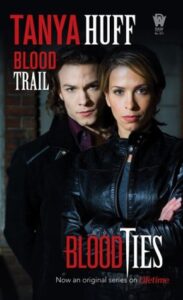 Blood Trail, Tanya Huff
Blood Trail, Tanya Huff
The second book in the Vicky Nelson series introduces more supernatural beings — this time werewolves, although the lore isn’t 100% traditional. (For example, werewolves are born, not created; if you aren’t a werewolf, you won’t become one.) It deals again, and more directly, with the problems that occur for supernatural beings living in a human community. The plot itself is reasonably obvious, and the ingredients make the outcome obvious: the way they get there and the characters surrounding them are more important, really.
Ultimately, I find this a comfort read; not too heavy on substance, more representative of real life than you often find (i.e. with Vicky’s disability, Henry’s sexuality, etc), and easy to read. There are some meaty things here — Celluci’s relationship with Vicky, and how that shapes his relationship with Henry; Vicky’s insistence on being independent, her certainty about her own skills and instincts despite her disability; prejudice against people that aren’t like you — and even some questions about justice and how exactly it can be enforced in special situations the law doesn’t cover (e.g. if someone killed a werewolf in their wolf form, so it’s not apparent that it is murder). But it’s treated with a fairly light hand, which keeps it highly readable.
I do wish Celluci would get with the program and grow up, though.
Rating: 3/5
Tags: book reviews, books, SF/F, Tanya Huff
Posted June 28, 2016 by Nicky in Reviews / 12 Comments
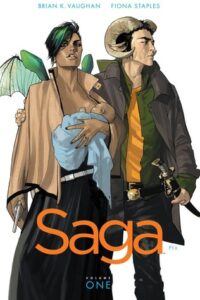 Saga Volume One, Brian K. Vaughan, Fiona Staples
Saga Volume One, Brian K. Vaughan, Fiona Staples
The first volume of Saga had me hooked right away: something about the clean lines of the art, the way it perfectly brings across character and expression, to begin with. Also the quirkier details, like the pictures that show on Prince Robot’s monitor. But also the story: the offbeat narration by a character who has only just been born at the start of the story, the set-up of the worlds fighting, the Robot kingdom assisting, etc. Alanna and Marko’s relationship is believably silly: they’re ridiculously in love, they’re not always best-suited for each other, but they’re muddling through anyway.
It’s also funny in general — not always in the most “tasteful” or “refined” way, as some of the sex-related humour shows, but believably. You can like these characters, it says, because even though one has wings and the other has horns, they’re dweebs like you.
Rating: 4/5
Tags: book reviews, books, comics, romance, SF/F
Posted June 26, 2016 by Nicky in Reviews / 0 Comments
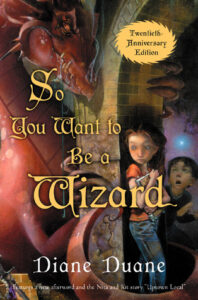 So You Want to Be A Wizard, Diane Duane
So You Want to Be A Wizard, Diane Duane
I’ve been told to try these so often that I more or less assumed the recommendation would be apt, and got a bundle of the whole series in one of Diane Duane’s website sales. Unfortunately, something about this doesn’t work for me — I guess it feels too random and immature? Stuff like ‘Fred’, the ‘white hole’, who is the opposite of a black hole, and some of the logic of how magic worked just… I didn’t feel hooked by it. Once I got to the white hole burping up whole cars, I was more or less done; I just skimmed the rest.
I do actually like parts of the set-up: the idea of the book that starts the main character’s journey is pretty neat, for example, and I didn’t read the characters as just default white kids from the start — even if Kit Rodriguez’s name wasn’t a probable giveaway. I think maybe if I’d first read it when I was younger, and had that flexibility of imagination, I wouldn’t have questioned it so much and could have enjoyed it now if I was rereading it. Unfortunately, I come to this as a 27 year old about to get married, and so I just can’t engage with it on that level.
Not something I would recommend to someone my own age, but I might very well pass it to a kid young enough to feel the magic of waiting for your Hogwarts letter, or scanning the library shelves for books about what you can be when you grow up and finding a mysterious book which at first might seem like a joke, but turns out all too real…
Rating: 1/5
Tags: book reviews, books, SF/F
Posted June 23, 2016 by Nicky in Reviews / 2 Comments
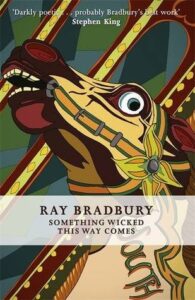 Something Wicked This Way Comes, Ray Bradbury
Something Wicked This Way Comes, Ray Bradbury
I had to write my review for this as soon as I was finished with it, because I know that I won’t be able to capture what I think about it if I leave it until I’m caught up on my reviews. I feel really weird about it: I know it’s a classic and I know how other people love it, and I even love some of the turns of phrase and the images and the ideas —
But the prose drives me batty. Taken as a whole, it just… it looks gorgeous, feels gorgeous on the tongue, but then falls all to bits and doesn’t seem to mean anything. Or it doesn’t suit the character, or it just obscures what the action of the scene is meant to be. The prose is beguiling and bewitching, but in the end didn’t seem to lead me anywhere. I read a part of it aloud to my partner — not even a bit I found the weirdest, just a passage that stood out to me — and reading it aloud sort of helped make it less opaque, but… But.
I really don’t know where I am with this book. It does have all the great things people have said about it, and it has all the over-exuberant piles of adjectives too. At times it feels more like poetry than prose — and like some poetry, best just absorbed and thought about later, analysed later or not at all, just savoured for the heaps of images and snippets of sense that do come through.
Rating: 2/5
Tags: book reviews, books, SF/F
Posted June 21, 2016 by Nicky in Reviews / 0 Comments
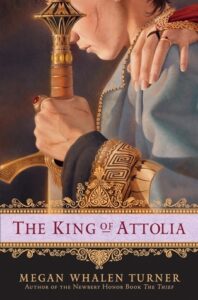 The King of Attolia, Megan Whalen Turner
The King of Attolia, Megan Whalen Turner
If you’ve read The Thief, Gen won’t have you fooled in this book, but it sort of doesn’t matter because the point of view character is Costis, a young soldier in the ranks of Attolia’s guard, and he is completely taken in by Gen. As are most Attolians. It’s a joy to watch Gen fooling the characters around him in just the way the reader is fooled when reading The Thief — and to try and keep up with the way he’s thinking, why he’s doing what he’s doing, etc.
It doesn’t gloss over the problems inherent in the situation: the difficult relationship between Irene and Gen, the difficulty of getting her Attolian subjects to accept him, Gen’s continuing issues with being so closely watched over by the God of Thieves… It keeps all the balls in motion, hinting at the further difficulties that will arise as Gen really becomes Attolia’s king, while delivering a more or less satisfying storyline for Costis as well. He’s a bit bland (not to mention easily fooled, at least from the reader’s point of view, and not that perceptive), but his growing loyalty to Gen works well.
Pacing-wise, I think this might be the most successful so far, but I don’t have recent enough memories of The Thief to be sure. But really, I just enjoy the heck out of Gen making his own way through life, and darn how Eddis or Attolia or the gods think he should go about it.
Rating: 5/5
Tags: book reviews, books, Megan Whalen Turner, SF/F
 The Island of the Mighty, Evangeline Walton
The Island of the Mighty, Evangeline Walton







